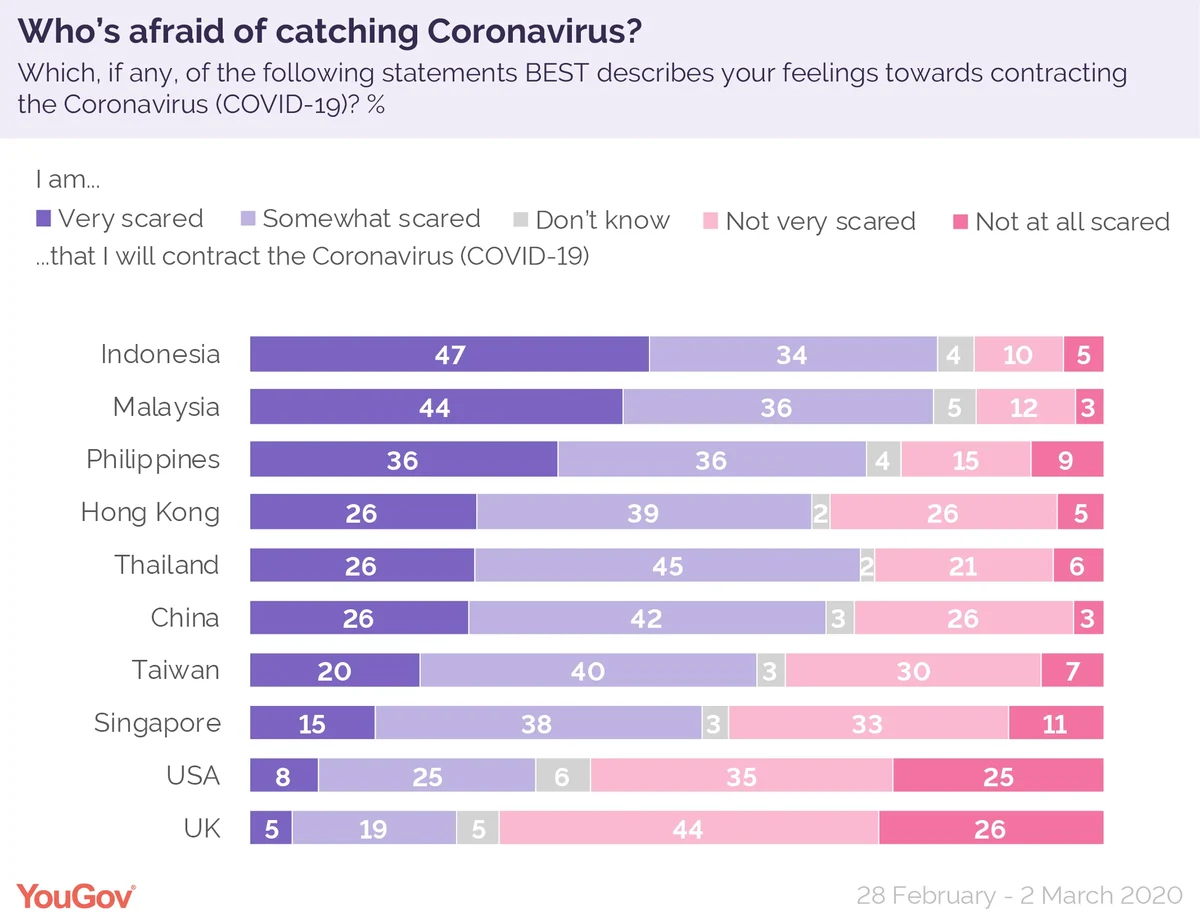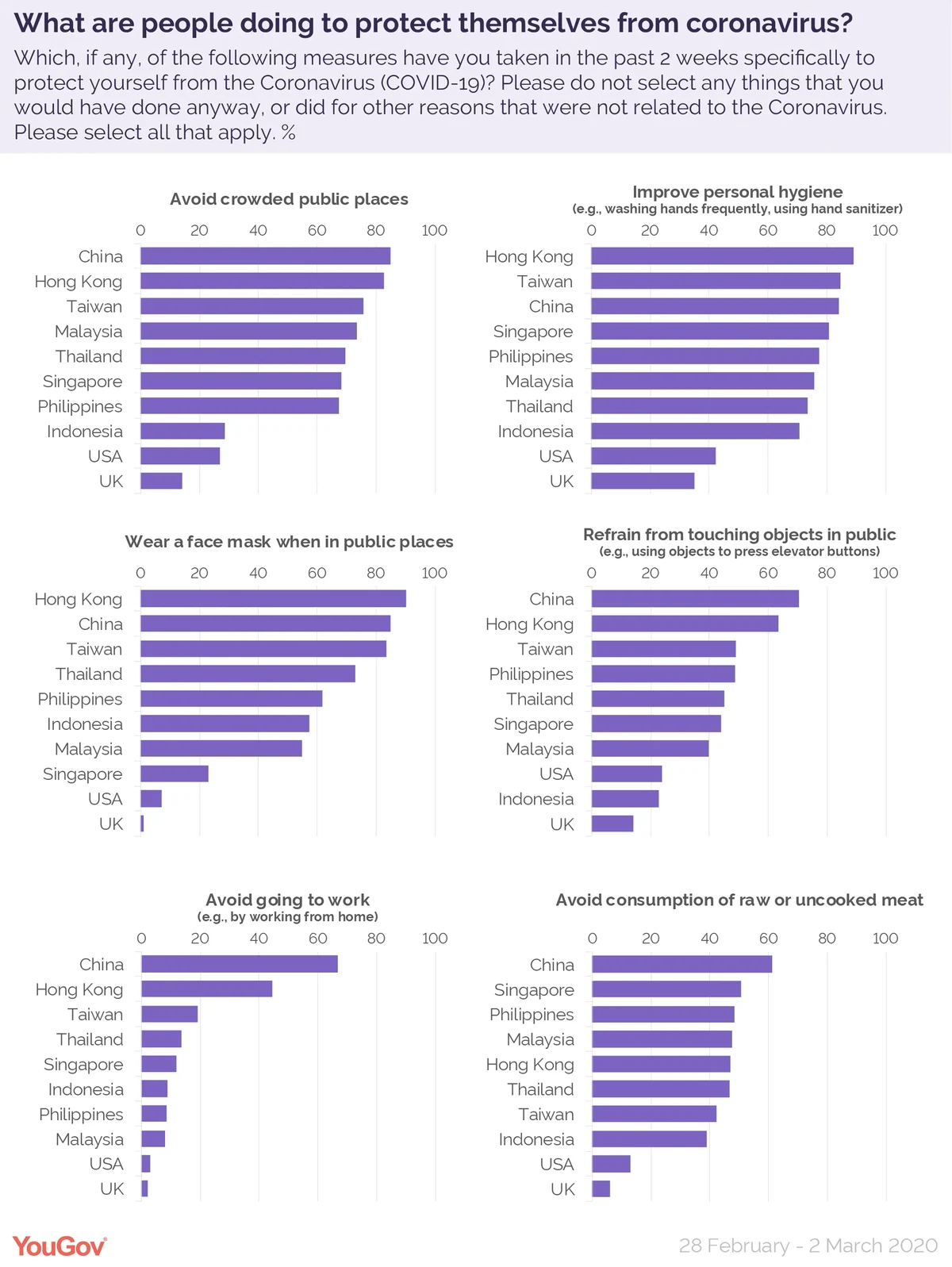A new YouGov study compares coronavirus attitudes across Asia, the UK and America
People are concerned about the coronavirus that’s spreading around the world, but how concerned depends on where they live. YouGov is conducting a series of studies to track how public opinion and behaviour respond as the disease becomes more prevalent.
How worried are people about catching coronavirus?
Concern is highest in Indonesia, where 47% say they are “very scared” of catching the disease. This contrasts with a rate of just 26% in China, which is tied for fourth place with Hong Kong and Thailand.
Malaysians are also highly likely to be very concerned that they will catch the disease (44%) followed by 36% of Filipinos. In Taiwan the figure is 20% and in Singapore 15%. Across the oceans only 8% of Americans and 5% of Britons report feeling as worried.

Despite some relatively low numbers of people reporting being “very” scared, in all Asian countries and regions surveyed the majority of people (from a low of 53% in Singapore to a high of 80% in Indonesia and the Philippines) report feeling either “very” or “somewhat” scared. Few people are unconcerned – just 3% of Malaysians and Chinese are “not at all scared” they will catch the condition, rising to a regional high of 11% in Singapore.
What are people doing to protect themselves from coronavirus?
One of the impacts of the coronavirus has been the reinvention of the handshake, with news footage depicting people in infected countries tapping one another’s feet by way of greeting instead of making skin contact.
In APAC nations more than 90% of people have made changes to their behaviour in order to protect themselves from infection. By contrast, in the USA this figure is only 57%, and in Britain fewer than half have done so (43%).
The most common change people have made is to improve their personal hygiene, e.g. washing their hands more frequently or using hand sanitiser. People are most likely to change their scrubbing routine in Hong Kong (89%), Taiwan (85%) and China (84%). The lowest figures in Asia are in Malaysia (76%) and Indonesia (71%).
Majorities in all Asian countries and regions have now started avoiding crowded places. In China, where quarantine measures are strictest, fully 85% say they are avoiding places where they might run into large numbers of people. This figure is 83% in Hong Kong.
But even in the rest of the region, where governments have not placed such measures on the public, most people (67-76%) are avoiding crowds. Indonesia is a notable exception, with only 28% saying they won’t go to crowded places – a figure much more comparable to the 27% in the USA and the 14% in the UK than the 85-67% in the rest of South East Asia.
Donning face masks is now common behaviour across the region. The rate is highest in Hong Kong (90%) and China (85%), both of which have mandatory requirements for people to wear them. Figures are more varied across the region, falling to 73% in Thailand, 62% in the Philippines, 57% in Indonesia and 55% in Malaysia.
Singapore is a significant exception. Despite the high population density of the isle, a mere 23% of Singaporeans are putting on face masks in public.
Two thirds of people in China (67%) and 45% in Hong Kong have reported avoiding going to work. These figures are far lower in all other countries and regions, however, with the next highest number being 19% in Taiwan, followed by 14% in Thailand and 12% in Singapore.
Seven in ten Chinese people (70%) say they’re refraining from touching objects in public, as do 63% of Hong Kongers. In the rest of the region this figure stands at 40-49%, except in Indonesia where only 23% are avoiding touching elevator buttons and the like – a similar figure to the 24% of Americans who say the same.
Consumption of raw or uncooked meat is also down, particularly in China where 61% say they’re less likely to eat it now.
What do people want their governments to do to combat coronavirus?
With governments across the world imposing measures to combat the spread of coronavirus, YouGov tested support for 12 steps they could take.
The most widely supported options are to quarantine anyone who has come into contacted with the afflicted (ranging from 72% in Singapore to 49% in Thailand). Also popular are calls to quarantine all passengers on flights from mainland China (from 66% in Taiwan to 50% in Thailand) and to ban such flights (64% in Thailand and Malaysia to 46% in the UK).
Least popular is the provision of free face masks for all (from 26% in the USA to 5% in Singapore). Also relatively unpopular are measures would be school closures (43% in Singapore to 12% in Indonesia), quarantine places infected patients have been (43% in Hong Kong to 24% in Singapore), and quarantining Chinese travellers (50% in Hong Kong to 19% in the UK).
Photo: Getty












